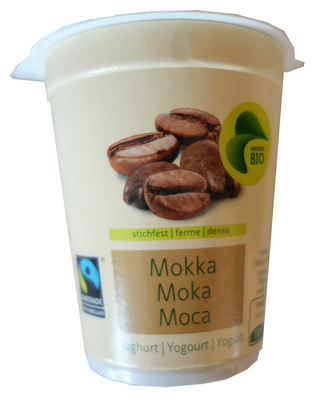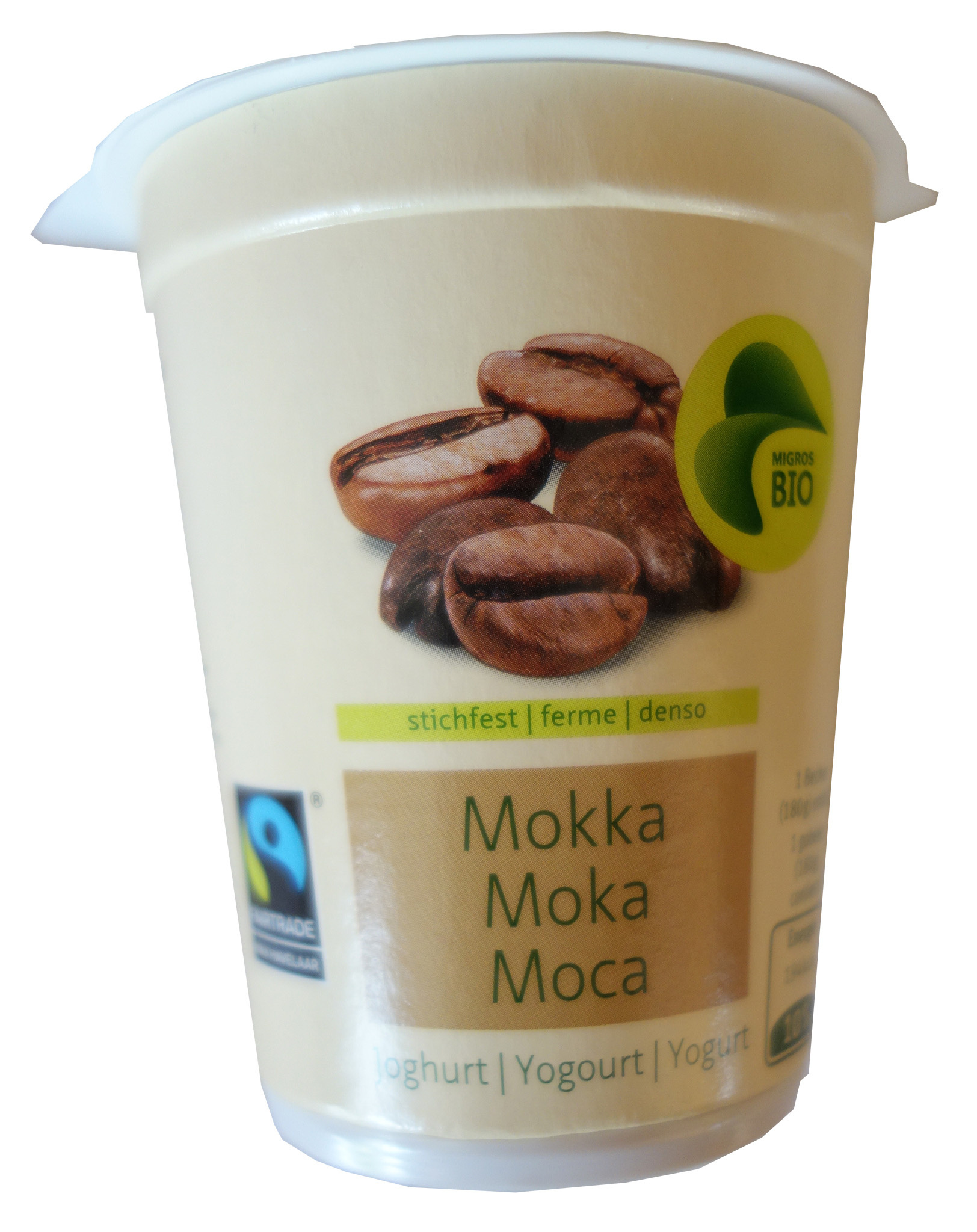Help us make food transparency the norm!
As a non-profit organization, we depend on your donations to continue informing consumers around the world about what they eat.
The food revolution starts with you!
Yogourt moka BIO - Migros - 180 g
Yogourt moka BIO - Migros - 180 g
This product page is not complete. You can help to complete it by editing it and adding more data from the photos we have, or by taking more photos using the app for Android or iPhone/iPad. Thank you!
×
Barcode: 7616600711319 (EAN / EAN-13)
Common name: Yogourt moka BIO ferme Fairtrade
Quantity: 180 g
Packaging: fr:Carton/plastique
Brands: Migros, Elsa, Migros Bio
Categories: Dairies, Fermented foods, Fermented milk products, Desserts, Dairy desserts, Fermented dairy desserts, Yogurts, Flavoured fermented dairy desserts, Flavoured yogurts
Labels, certifications, awards:
Fair trade, Organic, EU Organic, Fairtrade International, CH-BIO-006, Max Havelaar, fr:M-BIO


Origin of ingredients: Switzerland
Manufacturing or processing places: Estavayer Lait SA Laitiers Route de Payerne 2 1470 Estavayer-le-Lac FR Suisse, Suisse
Traceability code: CH 2434
Countries where sold: Switzerland
Matching with your preferences
Health
Ingredients
-
6 ingredients
: yogourt au lait entier (lait entier, lait écrémé en poudre, protéines du lait), sucre de canne brut 10,4 %, extrait de café 0,8%.Allergens: Milk
Food processing
-
Ultra processed foods
Elements that indicate the product is in the 4 - Ultra processed food and drink products group:
- Ingredient: Milk proteins
Food products are classified into 4 groups according to their degree of processing:
- Unprocessed or minimally processed foods
- Processed culinary ingredients
- Processed foods
- Ultra processed foods
The determination of the group is based on the category of the product and on the ingredients it contains.
Ingredients analysis
-
Palm oil free
No ingredients containing palm oil detected
-
Non-vegan
Non-vegan ingredients: Whole milk yogurt, Whole milk, Skimmed milk powder, Milk proteins
-
Vegetarian
No non-vegetarian ingredients detected
-
Details of the analysis of the ingredients
: yogourt au lait entier (lait entier, lait écrémé en poudre, protéines du lait), sucre de canne brut 10.4%, café 0.8%- yogourt au lait entier -> en:whole-milk-yogurt - vegan: no - vegetarian: yes - ciqual_proxy_food_code: 19593 - percent_min: 88.8 - percent_max: 88.8
- lait entier -> en:whole-milk - vegan: no - vegetarian: yes - ciqual_food_code: 19023 - percent_min: 29.6 - percent_max: 88.8
- lait écrémé en poudre -> en:skimmed-milk-powder - vegan: no - vegetarian: yes - ciqual_food_code: 19054 - percent_min: 0 - percent_max: 44.4
- protéines du lait -> en:milk-proteins - vegan: no - vegetarian: yes - percent_min: 0 - percent_max: 29.6
- sucre de canne brut -> en:unrefined-cane-sugar - vegan: yes - vegetarian: yes - ciqual_proxy_food_code: 31016 - percent_min: 10.4 - percent: 10.4 - percent_max: 10.4
- café -> en:coffee - vegan: yes - vegetarian: yes - ciqual_proxy_food_code: 18003 - percent_min: 0.8 - percent: 0.8 - percent_max: 0.799999999999997
- yogourt au lait entier -> en:whole-milk-yogurt - vegan: no - vegetarian: yes - ciqual_proxy_food_code: 19593 - percent_min: 88.8 - percent_max: 88.8
Nutrition
-
Average nutritional quality
⚠ ️Warning: the amount of fruits, vegetables and nuts is not specified on the label, it was estimated from the list of ingredients: 0This product is not considered a beverage for the calculation of the Nutri-Score.
Positive points: 1
- Proteins: 1 / 5 (value: 3, rounded value: 3)
- Fiber: 0 / 5 (value: 0, rounded value: 0)
- Fruits, vegetables, nuts, and colza/walnut/olive oils: 0 / 5 (value: 0, rounded value: 0)
Negative points: 5
- Energy: 1 / 10 (value: 452, rounded value: 452)
- Sugars: 3 / 10 (value: 15, rounded value: 15)
- Saturated fat: 1 / 10 (value: 1.8, rounded value: 1.8)
- Sodium: 0 / 10 (value: 40, rounded value: 40)
The points for proteins are counted because the negative points are less than 11.
Nutritional score: (5 - 1)
Nutri-Score:
-
Nutrient levels
-
Fat in moderate quantity (3.5%)
What you need to know- A high consumption of fat, especially saturated fats, can raise cholesterol, which increases the risk of heart diseases.
Recommendation: Limit the consumption of fat and saturated fat- Choose products with lower fat and saturated fat content.
-
Saturated fat in moderate quantity (1.8%)
What you need to know- A high consumption of fat, especially saturated fats, can raise cholesterol, which increases the risk of heart diseases.
Recommendation: Limit the consumption of fat and saturated fat- Choose products with lower fat and saturated fat content.
-
Sugars in high quantity (15%)
What you need to know- A high consumption of sugar can cause weight gain and tooth decay. It also augments the risk of type 2 diabetes and cardio-vascular diseases.
Recommendation: Limit the consumption of sugar and sugary drinks- Sugary drinks (such as sodas, fruit beverages, and fruit juices and nectars) should be limited as much as possible (no more than 1 glass a day).
- Choose products with lower sugar content and reduce the consumption of products with added sugars.
-
Salt in low quantity (0.1%)
What you need to know- A high consumption of salt (or sodium) can cause raised blood pressure, which can increase the risk of heart disease and stroke.
- Many people who have high blood pressure do not know it, as there are often no symptoms.
- Most people consume too much salt (on average 9 to 12 grams per day), around twice the recommended maximum level of intake.
Recommendation: Limit the consumption of salt and salted food- Reduce the quantity of salt used when cooking, and don't salt again at the table.
- Limit the consumption of salty snacks and choose products with lower salt content.
-
-
Nutrition facts
Nutrition facts As sold
for 100 g / 100 mlCompared to: Flavoured yogurts Energy 452 kj
(108 kcal)+24% Fat 3.5 g +42% Saturated fat 1.8 g +15% Carbohydrates 16 g +31% Sugars 15 g +30% Fiber 0 g -100% Proteins 3 g -14% Salt 0.1 g -13% Fruits‚ vegetables‚ nuts and rapeseed‚ walnut and olive oils (estimate from ingredients list analysis) 0 %
Environment
-
Eco-Score B - Low environmental impact
⚠ ️Select a country in order to include the full impact of transportation.The Eco-Score is an experimental score that summarizes the environmental impacts of food products.→ The Eco-Score was initially developped for France and it is being extended to other European countries. The Eco-Score formula is subject to change as it is regularly improved to make it more precise and better suited to each country.Life cycle analysis
-
Average impact of products of the same category: A (Score: 93/100)
Category: Yogurt, fermented milk or dairy specialty, flavoured, with sugar
Category: Yogurt, fermented milk or dairy specialty, flavoured, with sugar
- PEF environmental score: 0.16 (the lower the score, the lower the impact)
- including impact on climate change: 1.46 kg CO2 eq/kg of product
Stage Impact Agriculture
54.6 %Processing
19.4 %Packaging
9.3 %Transportation
9.7 %Distribution
5.5 %Consumption
1.5 %
Bonuses and maluses
-
Labels with very high environmental benefits
Bonus: +20
-
EU Organic
Organic agriculture contributes to preserve biodiversity, climate, water quality and soil fertility.
Organic food is food produced by methods complying with the standards of organic farming and features practices that cycle resources, promote ecological balance, and conserve biodiversity.
-
Fairtrade International
Fair trade is an arrangement designed to help producers in developing countries achieve sustainable and equitable trade relationships. Members of the fair trade movement add the payment of higher prices to exporters, as well as improved social and environmental standards.
-
-
Origins of ingredients with a medium impact
Bonus: +5
Environmental policy: +5
Transportation: 0
Origin of the product and/or its ingredients % of ingredients Impact Switzerland 100 %Medium
-
Packaging with a medium impact
Malus: -10
Shape Material Recycling Impact Unknown Plastic High ⚠ ️ The information about the packaging of this product is not sufficiently precise (exact shapes and materials of all components of the packaging).⚠ ️ For a more precise calculation of the Eco-Score, you can modify the product page and add them.
If you are the manufacturer of this product, you can send us the information with our free platform for producers.
Eco-Score for this product
-
Impact for this product: B (Score: 79/100)
Product: Yogourt moka BIO - Migros - 180 g
Life cycle analysis score: 93
Sum of bonuses and maluses: +15
Final score: 79/100 (The score of products with non-recyclable and non-biodegradable packaging materials is capped at 79 (grade B).)
-
Carbon footprint
-
Equal to driving 0.8 km in a petrol car
146 g CO² per 100g of product
The carbon emission figure comes from ADEME's Agribalyse database, for the category: Yogurt, fermented milk or dairy specialty, flavoured, with sugar (Source: ADEME Agribalyse Database)
Stage Impact Agriculture
59.4 %Processing
11.5 %Packaging
12.4 %Transportation
13.8 %Distribution
2.4 %Consumption
0.5 %
Packaging
-
Packaging with a medium impact
-
Packaging parts
(Plastic)
-
Packaging materials
Material % Packaging weight Packaging weight per 100 g of product Plastic
-
Transportation
-
Origins of ingredients
Origins of ingredients with a medium impact
Origin of the product and/or its ingredients % of ingredients Impact Switzerland 100 %Medium
Labels
-
EU Organic
Organic agriculture contributes to preserve biodiversity, climate, water quality and soil fertility.
Organic food is food produced by methods complying with the standards of organic farming and features practices that cycle resources, promote ecological balance, and conserve biodiversity.
-
Fairtrade International
Fair trade is an arrangement designed to help producers in developing countries achieve sustainable and equitable trade relationships. Members of the fair trade movement add the payment of higher prices to exporters, as well as improved social and environmental standards.
Report a problem
-
Incomplete or incorrect information?
Category, labels, ingredients, allergens, nutritional information, photos etc.
If the information does not match the information on the packaging, please complete or correct it. Open Food Facts is a collaborative database, and every contribution is useful for all.
Data sources
Product added on by emerycm
Last edit of product page on by roboto-app.
Product page also edited by foodrepo, itsjustruby, openfood-ch-import, openfoodfacts-contributors, packbot, teolemon, yuka.VDdFZUVhNVJ2dnRRdmNZLzl6RGw1ZE1sN0p1dFhtRzlCdlFJSWc9PQ.









